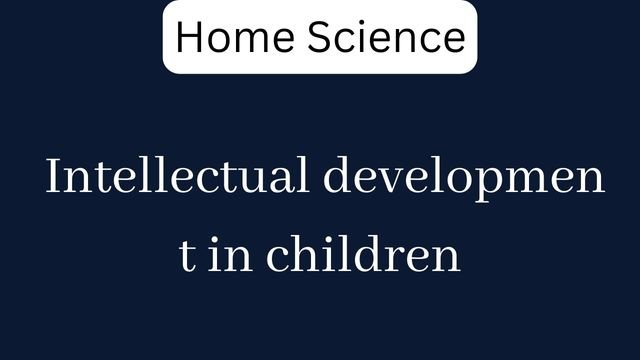Intellectual development in children
Wisdom or intellect is a strength which gives an individual the ability to adjust with the changing situations. Intellect determines the individual’s talent and individuals can be divided into sharp normal and feeble minded.
Intellectual development during childhood
1. Development of interest
2. Development of retention capacity
3. Curious tendency of a child develops
4. Observation capacity of a child develops and senses gain maturity.
5. Increase in reasoning ability with increase in curiosity.
6. Decision making ability increases.
7. Analyzing, memorizing, imagination and creativity develops.
8. Problem solving ability increases.
Factors affecting intellectual development
1. Physical health
2. Environment
3. Gender differences
4. Age differences
5. Sequence of child birth
6. School
7. Society
8. Mental maturity
9. Genetics
10. Sensory dysfunction
11. Brain defects
12. Education
13. Personality
14. Surroundings
Home Science Latest Post :- Click Here
Important Points of Development in Infancy and Childhood :-
- Childhood is an extremely important step of all the steps involved in life span development. In this stage, growth and development in children takes place at a very rapid rate.
- By the end of childhood stage height of a child is 57.5 inches and weight is 48 kg.
- Malnutrition, physical weight and size, modest qualities and feeble mind, emotional condition, lack of learning opportunities, lack of encouragement, etc. are the factors affecting child’s development.
- Cognition is the ability or process of acquiring knowledge and understanding through thought, experience, and the senses.
- A child learns to reason, contemplate, analyze, memorize by intellectual and mental development.
- Memorizing ability, reasoning ability, questioning ability, contemplating ability, generalizing ability-are some of the cognitive abilities of childhood.
- Wisdom or intellect is a strength which gives an individual the ability to adjust with the changing situations.
- Hardships of speech development are- voice defects and voice disorders such as defects in pronunciation, defects in sentence formation, (v) word meaning related defects, faulty pronunciation, unclear pronunciation, stammering, lisping and sharp obscure speech
- Bilingual in general means- ‘using two 2. languages’.
- Stages of language development- crying, blabbering, facial expressions, pronunciation, analyzing power, vocabulary, sentence formation.
- Ethical behavior is the conduct according to the ethical code of a social group.
Development in Infancy and Childhood Questions-Answers
1. Which of the following does not affect physical development?
(a) Malnutrition
(b) Nutrition
(c) Disease
(d) Fear
Click to show/hide
2. Which of the following is a cognitive ability of childhood?
(a) Maturity
(b) Senses
(c) Reasoning ability
(d) Wisdom
Click to show/hide
3. How many languages are used in bilingualism?
(a) Two
(b) One
(c) Three
(d) Five
Click to show/hide
4. Which is a voice disorder?
(a) Defect in pronunciation
(b) Deaf and dumb
(c) Stammering
(d) Defect in sentence formation
Click to show/hide
5. Which of the following is not a common emotion?
(a) Fear
(b) Smiling
(c) Anger
(d) Shyness
Answer :- ?????
